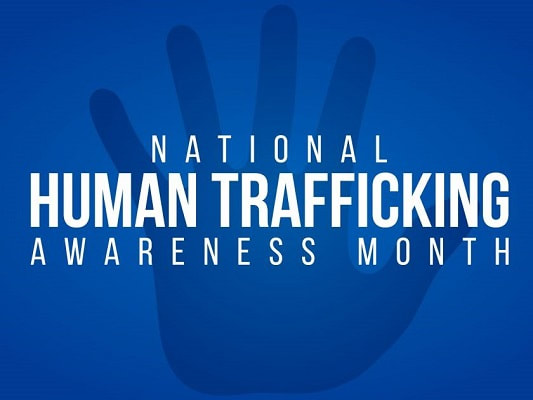 National Human Trafficking Prevention Month January has been proclaimed National Human Trafficking Prevention Month and its aim is to raise awareness about human trafficking and to educate the public about how to identify and prevent this crime. As explained by the US Department of State, “Human trafficking, also known as trafficking in persons, includes both forced labor and sex trafficking. It not only represents a threat to international peace and security but also undermines the rule of law, robs millions of their dignity and freedom, enriches transnational criminals and terrorists, and threatens public safety and national security everywhere. There are estimated to be more than 24.9 million people — adults and children — subjected to human trafficking around the world, including in the United States. Traffickers often take advantage of instability caused by natural disasters, conflict, or a pandemic to exploit others. During the COVID-19 pandemic, traffickers are continuing to perpetrate the crime, finding ways to innovate and capitalize on the chaos.” In October 2020, the Financial Crimes Enforcement Network (FinCEN) issued a supplemental advisory on identifying and reporting human trafficking, which can be found here. This supplements the 2014 FinCEN Guidance on Recognizing Activity that May be Associated with Human Smuggling and Human Trafficking – Financial Red Flags, found here. As explained by FinCEN in its 2020 guidance, “in addition to the horrific toll on victims and their families, their very lives, dignity, and livelihood, human trafficking is now one of the most profitable and violent forms of international crime, generating an estimated $150 billion worldwide per year. In the United States, human trafficking now occurs in a broad range of licit and illicit industries (e.g., hospitality, agricultural, janitorial services, construction, restaurants, care for persons with disabilities, salon services, massage parlors, retail, fairs and carnivals, peddling and begging, childcare, domestic work, and drug smuggling and distribution).” The information financial institutions (such as credit unions) collect and report is vital to identifying human trafficking and stopping the growth of this crime. It is also critical that customer-facing credit union staff are aware of behavioral indicators that may indicate human trafficking. Many victims of human trafficking do not have regular contact with anyone other than their traffickers. The only outside contact they may have is when visiting financial institutions such as credit union branches, check cashing counters, or money wiring services. Credit unions should be sure to review both advisories and make sure staff are aware of red flags that may indicate human trafficking. To highlight a few behavioral red flags from the 2020 FinCEN guidance:
The FinCEN advisories also provide guidance on identifying financial indicators/red flags for identifying transactions potentially related to human trafficking. Additionally, the advisories provide direction on proper completion of Suspicious Activity Reports (SARs). In addition to guidance from FinCEN, the FBI also has a number of resources which can be found here, including resources for the victims of human trafficking. In 2018, Polaris issued a report “On-Ramps, Intersections, and Exit Routes: A roadmap for Systems and Industries to Prevent and Disrupt Human Trafficking” which can be found here. Polaris is engaged in eradicating modern slavery by systemically disrupting the human trafficking networks that rob human beings of their lives and their freedom. Polaris also assists survivors in restoring their freedom, preventing more victims, and leveraging data and technology to pursue traffickers wherever they operate. Credit unions of all sizes play an important role in identifying and reporting transactions related to human trafficking activities based on their observations when interacting with customers and their monitoring processes. This report focuses on the private sector, such as banking, and how it intersects with human trafficking. As discussed in the introduction, “The more that is known about the business plans of human trafficking, the more possible it becomes to prevent and disrupt the crime and help survivors find freedom. The insights here are gleaned from those in a position to understand the nuances of each business intersection point – the survivors who lived the experience.” This report builds on Polaris’ previously issued report, the Typology of Modern Slavery. This report classified 25 distinct types of human trafficking business models in the United States. These categories range from ag and animal husbandry to carnivals, commercial cleaning, construction and domestic work. Several categories also relate to sex trafficking, such as illicit massage businesses, pornography, escort services, and bars, strips clubs and cantinas. A list and description of all categories can be found on Page 6 of this report. Polaris states that, “a strategic approach to ending human trafficking includes understanding the ways each of these systems enables or intersects with potential traffickers or victims.” On page 8 there is a matrix that lists the 25 types of human trafficking and how that category intersects with eight systems/industries. The financial services industry, which obviously includes credit unions, intersects with 22 of the 25 categories of human trafficking. While the entire report is very important, discussion relating to the financial services industry starts on page 37. As noted above, this report is built on survivor experience. One quote that caught my attention, “One focus group survivor who made at least four separate deposits totaling over $5,000 into her recruiter’s account in the Philippines, pleaded, “I wish [someone] would have asked what all that money was for.” (page 43). Another survivor quoted in the report shared this story regarding credit history, “...he would focus strictly on girls that were 17 about to turn 18 just because their credit would be fresh. He could have them get credit cards. Versus someone who’s already been in the life, even if they’re only in their early 20’s... [their credit] would be jacked up already. So he started focusing on girls not only for the profit margin because of their age, but because he could work with their credit. That would be a recruitment question before they come: “How’s your credit?” Because he started realizing credit was important for things like getting a house or things like that in the future. He knew he couldn’t do that with just cash.” (page 44) Please review (at least) the section of this report relating to Financial Services. Credit unions are in the position to assist with preventing and disrupting this industry that is impacting an estimated 25 million people globally. As always, DakCU members may contact Amy Kleinschmit with any compliance related questions. Comments are closed.
|
The MemoThe Memo is DakCU's newsletter that keeps Want the Memo delivered straight to your inbox?
Archives
July 2024
Categories
All
|
|
Copyright Dakota Credit Union Association. All Rights Reserved.
2005 N Kavaney Dr - Suite 201 | Bismarck, North Dakota 58501 Phone: 800-279-6328 | [email protected] | sitemap | privacy policy |





